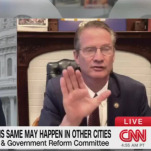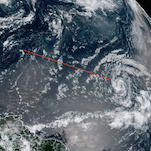Guidelines Released To End 'School-to-Prison Pipeline'
It’s a well-established fact: Minority students are more likely to receive harsher punishments for infractions at school than white students. According to government data, what starts out as more trips to the principal’s office can end up being more time in juvie, more time in court and more time behind bars. It’s a phenomenon known as the “school-to-prison pipeline” and it’s a pathway the Obama administration would like to break.
A report released jointly by the Justice Department and the Education Department on Wednesday outlined disparities in how minority and non-minority students are treated and included recommendations for amending school discipline tactics.
Research indicates that the difference in discipline tactics for children of different races is not explained by “more frequent or more serious misbehavior” by minority students, either. In other words, there’s something else going on.
“[S]ignificant and unexplained racial disparities in student discipline give rise to concerns that schools may be engaging in racial discrimination that violates the Federal civil rights laws,” reads the report.
Government data from 2011-12 shows that black students were more than three times as likely as whites to be expelled or suspended. And more than half of students arrested or referred to law enforcement were black or Hispanic. Nearly three-quarters of the students who qualified for special education services were suspended or expelled at least once.
“A routine school disciplinary infraction should land a student in the principal’s office, not in a police precinct,” Attorney General Eric Holder said in a statement. “This guidance will promote fair and effective disciplinary practices that will make schools safe, supportive and inclusive for all students. By ensuring federal civil rights protections, offering alternatives to exclusionary discipline and providing useful information to school resource officers, we can keep America’s young people safe and on the right path.”
Suspensions and referrals to law enforcement don’t always help kids. In fact, as the report points out, they can have negative long-term consequences. Student who are suspended or expelled are more likely to avoid school later, less likely to pursue higher education and more likely to have even more severe behavior problems down the line. All of these things can impact their ability to land and keep a job, and consequently, their ability to support themselves or a family.
To improve discipline practices and make sure students are treated fairly, the report outlines a variety of recommendations and offers links to trainings for teachers and other officials.
Here are some of the suggestions:
-

-

-

-

-

-

-

-

-

-

-

-

-

-

-

-

-

-

-

-

-

-

-

-

-

-

-

-

-

-

-

-

-

-

-

-

-

-

-

-

-

-

-

-

-

-

-

-

-

-

-

-

-

-

-

-

-

-

-

-

-

-

-

-

-

-

-

-

-

-

-

-

-

-

-

-

-

-

-

-

-

-

-

-

-

-

-

-

-

-

-

-

-

-

-

-

-

-

-

-

-

-

-

-

-

-

-

-












































































































